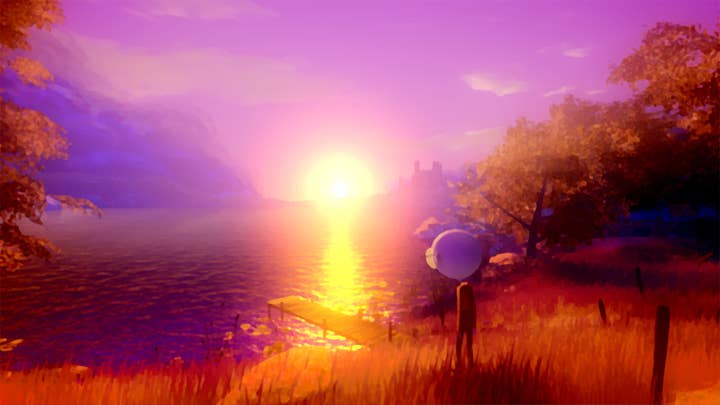“People in AAA talk about games being mainstream - they're not”
But they soon will be, and Massimo Guarini founded Ovosonico to be a different kind of studio, making a different kind of game
When you visit game developers on a regular basis it doesn't take long before the environments in which their employees work blend into a homogenous whole.
They are generally in the centre of major cities or development hubs, with open-plan floors, exposed brickwork and ceilings, and brightly coloured, low-slung furniture. Statues of game characters populate their halls, and meeting rooms are named after iconic locations from a familiar handful of fantasy and science fiction franchises. They are energetic, welcoming spaces by design, but they are often designed in exactly the same way.
Ovosonico is different. It is not located in Milan, where a great many of Italy's developers are based, all of whom were gathering at Milan Games Week when GamesIndustry.biz visited the company. It is not even located on the outskirts of Milan, where rent prices may be cheaper. Reaching Ovosonico requires a 55km drive to the north of the city, into the lush, green countryside at the foot of Campo dei Fiori mountain range. The 'office' is a sunset-coloured mansion, with a garden terrace overlooking the small city of Varese as it tumbles down the side of the hill towards the lake.
"Stay away from your work, and stay away from video games. Usually, that's where your best ideas will come from"
Varese is one of those impossibly picturesque places that Italy has in abundance, and being based here, CEO Massimo Guarini tells me, costs no more than the identikit office spaces found in Milan. When I walked up the winding gravel path to Ovosonico's gates and pushed the bell, I had only one thought in my head: this is no ordinary game developer.
That impression, Guarini says, is not an accident. As much as the games it makes, the space in which Ovosonico's team works is an expression of the studio's intent, and the principles on which it was founded.
"The very reason I made this studio is because I hate video games," Guarini says with a knowing grin. "I got increasingly bored by games. Probably because I got older, I started to feel a sort of frustration. I couldn't relate any more to how games worked and also to what kind of content they provided to gamers as a whole."
That realisation crept up on Guarini across a career that had evolved in much the way he dreamed it would. From Ubisoft Milan he went to Ubisoft Montreal, and from Montreal he went to Grasshopper Manufacture in Japan, carving out a career in AAA games from a country with no AAA industry of its own. And yet realising his ambitions prompted "a weird reaction," a nagging sense that he'd taken a wrong turn.
"It made me question: Is this still what I want to do in life? Making games in this way? Should I try something different? I kind of stopped playing video games. I just couldn't find anything on the market that got my interest."

Inspiration arrived in the form of several landmark indie games that launched around the start of this decade. Limbo and Journey, in particular, showed that games could be emotive and introspective and beautiful, and they could be all of these things without demanding lightning fast reactions and dozens of hours of the player's time. They were both accessible and emotionally resonant in ways that games had rarely been before, and Guarini recognised an opportunity to push even further in that direction. In that moment of clarity, Ovosonico was born.
"It's not like we want to start a revolution, because we know there are already other people trying to do this," he says. "But to me, it's just personally important to explore ways to deliver new messages, and use our medium to express something in a personal way."
"This is the first time in history that a generation of video game creators is retiring. It's mind-blowing, when you think about it"
As origin stories go, this is hardly remarkable. The excitement of that initial indie boom caused an outbreak of itchy feet right across the AAA community, but not every studio that emerged in the aftermath sought a harmony between the kind of games they wanted to make and the environment in which they are created. This is why Ovosonico is surrounded by trees and mountains and terracotta-roofed villas, rather than steel and traffic and prohibitive rent prices.
"I really wanted a house; a place where people could actually hang around," Guarini says. "We are always inviting artists [here], or musicians for recording, so having a place where they can sleep and have some privacy. It feels like a small Skywalker Ranch. Very, very, very small, but that's the model.
"For me, and this is something I felt back when I was working in AAA, it's important to refresh your mind. Watch movies, have a walk, play music, listen to music, read a book, climb a mountain, whatever - but stay away from your work, and stay away from video games. Usually, that's where your best ideas will come from."
Having spent an evening at Ovosonico, it's clear that both it and Varese in general provide an appropriately serene backdrop for all of these activities - even climbing a mountain, considering that a snow-tipped range is visible from the rear garden of the studio. This environment is not for everyone, Guarini admits, but it has served almost as a filter when it comes to recruitment. Just as I felt when approaching the building for the first time, the setting makes it clear that this is a studio that thinks differently.
"The people that join us are fully aware of what we want to do, and what we want to challenge," he adds. "In the games industry in general, in my opinion, we tend to be homogenous. We see and perceive ourselves only as developers, as engineers."

Ovosonico was founded with a desire to break from homogeneous thinking, and to work towards new kinds of experiences for a cultural shift that Guarini believes will open up the games market in the coming years. He refers to how the industry 'perceives' itself, and that perception is still strongly linked to totemic figures from gaming's past. Guarini doesn't refer to anyone specific, but it's not unreasonable to suggest that developers like Will Wright, Peter Molyneux, Warren Spector and even Shigeru Miyamoto would be within that group; all pioneers, all male, and all edging ever further towards the periphery of the industry, if they are still in the industry at all.
"We still rely on that older generation of creators, and it's really exciting, because this is the first time in video game history that we're actually witnessing a change of generation - both in terms of creators and audience.
"Playing a video game will be as easy as watching Netflix today... This will allow for any sort of audience to approach the medium"
"Today, for the first time, we have 60 year-old developers. This is the first time in history that a generation of video game creators is retiring. It's mind-blowing, when you think about it. But it's also the first time that we'll have 50 or 60 year-olds playing video games."
This will cause a shift in two directions, Guarini suggests, with new ideas and perspectives rising to prominence as the previous generation retires, and new appetites and expectations among consumers as the addressable market becomes more diverse. With games like The Last Day of June, Ovosonico hopes to create experiences that can satisfy the core audience, while also appealing to those, "who quit games, who hate games, who think we're all silly nerds."
There are more of those people than the industry likes to admit, Guarini says, people who see all games as falling somewhere on a continuum between Call of Duty and Candy Crush. This is, of course, not true, but it's worth considering just how many people who don't care for games would love Giant Sparrow's What Remains of Edith Finch, for example, and how many of that same group would dismiss it before they even understood what it was.
"People in AAA talk about games being mainstream now - they're not," he adds. "Games still are not mainstream enough. When you see [What Remains of Edith Finch] you can get excited, but you might not be able to get your wife or girlfriend excited as well. Because they have always thought about it as, 'Yeah, but it's just a game'."
This kind of rhetoric is often ignored or even attacked by vehement gamers, but for Ovosonico it is both philosophy and business strategy. When the studio took on investment from Digital Bros. two years ago, it was largely down to playing the long game; to make sure that the studio would be operational, independent, and have a portfolio of owned IP when the technology to play rich, emotive games is accessible to everyone.
"We strongly believe that there will be a day when the technological barrier to entry will be lowered," Guarini says. "Playing a video game will be as easy as watching Netflix today, and even easier than watching cable television. This will allow for any sort of audience to approach the medium, but only if the right sort of content is available.
"I didn't make this thing to sell it in five years. I feel like Ovosonico is my kid, so I want to be there. Hopefully we'll be ready for when the market no longer has these barriers that we've built."
GamesIndustry.biz visited Milan Games Week as a guest of the Italian trade body AESVI.
